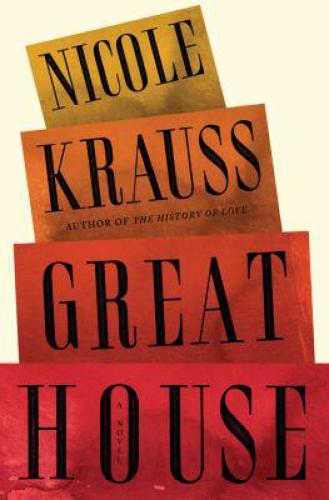
Great House
A Novel
کتاب های مرتبط
- اطلاعات
- نقد و بررسی
- دیدگاه کاربران
نقد و بررسی

Starred review from December 20, 2010
A writing desk serves as Krauss's literary device to connect five striking vignettes. So, too, are the characters emotionally linked through lives that involve writing and reading, love overshadowed by loss, and connection outweighed by isolation. The book is narrated at a stately pace—which will be appreciated by the serious listener who might wish to stop the audio to write down a line or two—by Robert Ian MacKenzie (narrator of McCall Smith's 44 Scotland Street series) who demonstrates that he can do wonders with material he can sink his teeth into. His performance as a British professor married to a reclusive writer is a marvel, and Alma Cuervo's evocation of a lonely author haunted by her relationship to a previous owner of the desk is affecting and nuanced. Listeners who enjoy lingering over a top-notch novel will be intellectually nourished by this audio. A Norton hardcover.

July 15, 2010
A many-drawered writing desk resonates powerfully but for different reasons with the various characters in this novel about loss and retrieval from Krauss (The History of Love, 2005, etc.).
This brain-stretching novel travels back and forth across years and continents. In 1972 New York, a young novelist named Nadia spends one magical evening with a Chilean poet, Daniel, who then returns to Chile. Daniel leaves in her care a desk he claims belonged to Federico GarcÃa Lorca. Shortly afterward, he dies at the hands of Pinochet's secret police. In 1999 a young woman named Leah announces to Nadia that she is Daniel's daughter and wants his desk returned. The reclusive Nadia lets Leah, who resembles Daniel, ship the desk to her home in Jerusalem but is emotionally devastated afterward—the desk represents her writing life. Her sense of herself as a woman and a writer deeply shaken, she decides to visit Jerusalem. Meanwhile in Jerusalem, a retired lawyer yearns to connect to his son Dovik, who has left his own legal career in England to move in with his father after his mother's funeral. Barely speaking, Dovik remains a frustrating mystery to his father. Back in 1970 in London, an Oxford professor finds his jealousy pricked when his wife Lotte, a writer and Holocaust survivor, gives her writing desk to the young poet Daniel, an admirer of her work. Only later, learning that Lotte gave up a baby for adoption before she married, does he realize that Daniel became a surrogate for her lost son. In 1998 in London, Leah is living with her brother when she goes to New York in search of the desk. While the disparate characters do not necessarily interact, their choices affect one another over the course of decades.
Brainy and often lyrically expressive, but also elusive and sometimes infuriatingly coy; Krauss is an acquired taste.
(COPYRIGHT (2010) KIRKUS REVIEWS/NIELSEN BUSINESS MEDIA, INC. ALL RIGHTS RESERVED.)

August 1, 2010
In this latest from Krauss (The History of Love), a huge old desk with many drawers becomes the symbol of love and loss for a host of characters from different countries and time periods. There is the New York woman who has written all her novels at the desk, which she was keeping for a Chilean poet who has since disappeared. Then there are the poet's daughter, who comes back years later to claim the desk; the antiques dealer who tracks down meaningful items from people's pasts; the brother and sister who live isolated in a Jerusalem home filled with other people's furniture; the elderly couple in England who live with the desk and a horrible secret; and the dictatorial father who desperately tries to understand his creative son. VERDICT While each character's story is engrossing, the connection among them is at times impossible to follow. Still, Krauss deals with heavyweight themes--the Holocaust, the different ways people cope with suffering, the special cruelty of fathers, the costs of creativity--with meditative, insightful prose that makes for an intense and memorable reading experience. [See Prepub Alert, LJ 5/15/10.]--Joy Humphrey, Pepperdine Univ. Law Lib., Malibu, CA
Copyright 2010 Library Journal, LLC Used with permission.

Starred review from September 1, 2010
Krauss, in her follow-up to the best-selling History of Love (2005), tells her story entirely through the voices of her characters. All of the elements of literary fiction are conveyed through the monologues of five people: a writer from New York, an angry Jewish father from Jerusalem, an American woman studying in Oxford, the baffled husband of a Holocaust refugee, and an 'minence grise who wraps things upbut not too tightly. Readers follow the trail, set forth in straightforward narrative and flashbacks, of an immense desk, which casts its shadow (sometimes literally) over the lives of all five characters. The plot is intricate and rewards careful reading. Krauss masterful rendition of character is breathtaking, compelling, and reminiscent of ZZ Packer at her very best. In addition, the points of view of the various narrators, taken as a whole, present a broad picture of plot and motivation. Thematically strong, Great House examines the daily survival of Jews and demonstrates the destructiveness of lies and secrets within families. This tour de force of fiction writing will deeply satisfy fans of the authors first two books and bring her legions more.(Reprinted with permission of Booklist, copyright 2010, American Library Association.)

























دیدگاه کاربران